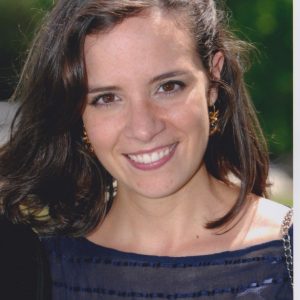Cátia Alexandra Oliveira Azenha – Fellowship Grant Report from Univeritätsklinikum Essen, Germany
 I was awarded a 3 months SOE Fellowship Grant that I used to visit the University Hospital of Essen, Germany.
I was awarded a 3 months SOE Fellowship Grant that I used to visit the University Hospital of Essen, Germany.
It is the biggest hospital in the Ruhr, the largest urban area in Germany, receiving around 195,000 outpatients and admitting 53,000 inpatients every year. With its wide campus and numerous buildings it is like a small “city” on its own.
The Ophthalmology Department is reference in many areas, notably in Ocular Oncology and Thyroid Eye Disease (TED).
As it was my goal, I attended the Orbit Centre clinical and investigation activities.
This Centre is included in the Ocular Adnexal Unit, which also unifies Strabismus, Oculoplastic Reconstructive Surgery, Neuro-ophthalmology and Paediatric Ophthalmology. This department has a very close collaboration to the ENT department for endoscopic head and neck surgery and to the oral maxillofacial surgery department.
This Centre has a wide case mix and case load of orbital pathologies: oncology, trauma, inflammatory diseases and specially TED (with an average weekly case load of 40 patients only for TED).
I took part of all Department’s daily activities, supervised by Prof. Esser, Prof. Eckstein and senior resident Dr. Dekowski. Surgical interventions were scheduled 3 days a week and Thyroid Eye disease Clinic took place mainly once a week. I was further trained in clinical assessment of these patients and their medical treatment and surgical rehabilitation. I observed and assisted several surgical techniques of orbital decompression: minimal lateral decompression from extern, endoscopic medial decompression and coronal approach. In addition to the orbital training I observed the examination and surgical treatment of restrictive strabismus and lid changes in Graves’ orbitopathy patients. I also participated in all other Clinics of the Department: Paediatric Ophthalmology (mainly squint and amblyopia patients), Eyelid clinic and routine orbital Clinic.
I also took part at the weekly clinical and basic science research group meetings and visited the Laboratory of Molecular Ophthalmology, where I had the opportunity of observing in vivo and in vitro Graves’ orbitopathy models research. I had the privilege of designing and implementing a research project group on FACS analysis of biopsy specimens from patients with lymphoproliferative lesions.
I felt it was very important to have knowledge of the German language before going, since it is necessary for an effective communication with patients and to understand all that is discussed between the staff. Nevertheless, despite not being fluent in the language, I always felt involved by our colleges that translated and explained me most of what was discussed in English. I learned new approaches to orbit conditions and management protocols. In this context of orbit patients’ management I have also attended ENT and OMF-Surgery OR.
The Oculoplastic Department is also responsible for squint patients; therefore I also observed the orientation and assisted surgeries of these. The staff is very caring and attentive. The relationship constructed was of sharing experience and knowledge.
The Clinic has its own guesthouse in the campus, where guest-workers can be conveniently accommodated.
I felt most welcomed in Essen University clinic and even made friends among our colleagues.
This learning opportunity was very enriching and greatly improved my daily clinical practice and shed new lights in my research projects. I am very grateful for SOE Fellowship Grant that made this extraordinary professional and personal experience possible.
